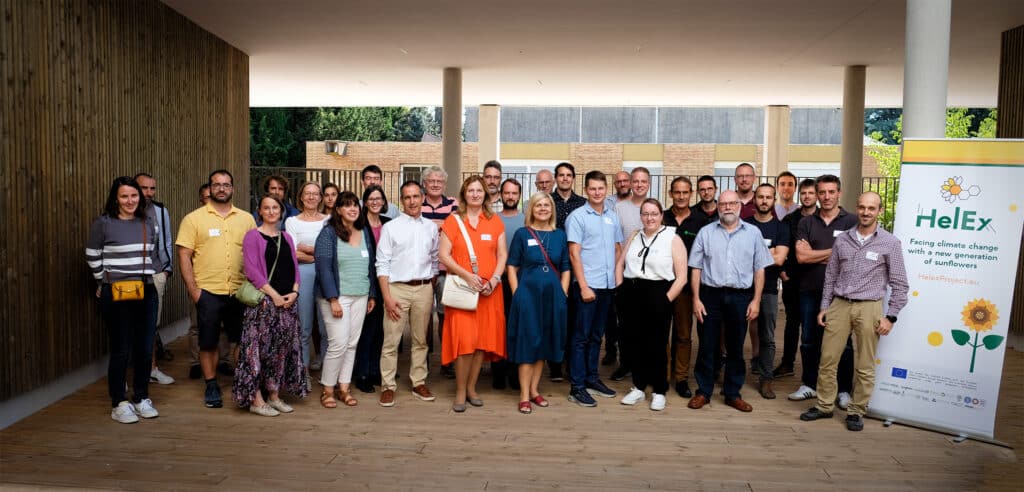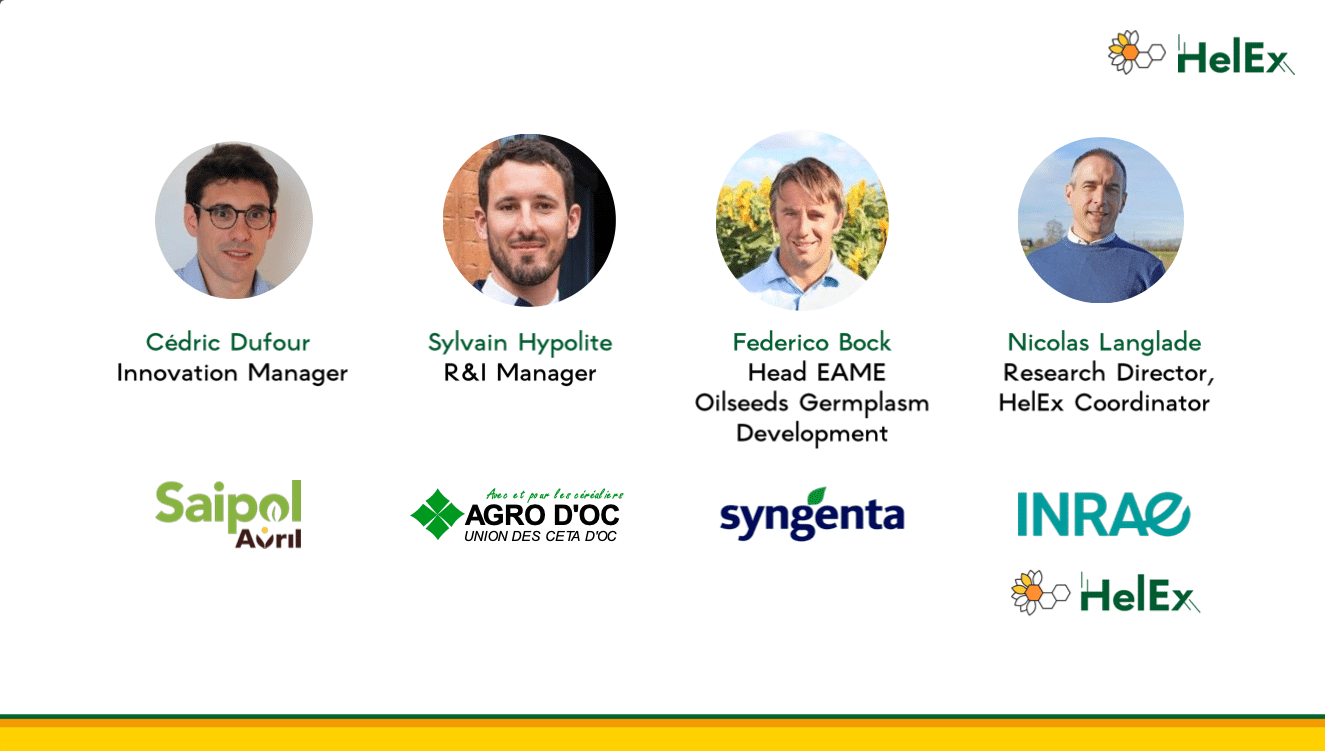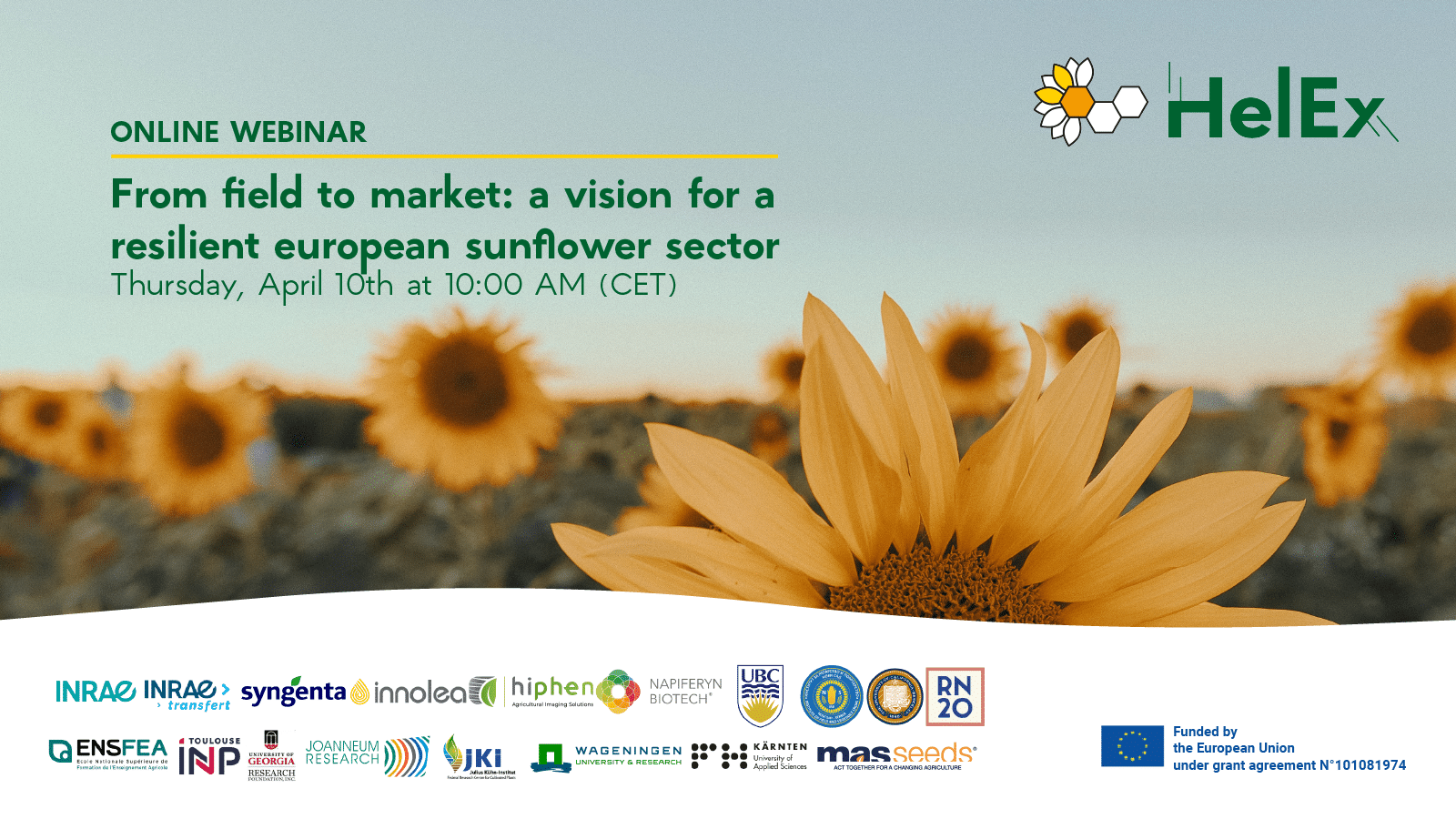For the first time, an international, multidisciplinary consortium has been set up for sunflower research, bringing together world leaders in ecology, economics, genetics, and biotechnology to sunflower ecology and breeding. The HelEx – Helianthus Extremophiles – project involves 18 partners working on developing new sunflower varieties more resistant to high temperatures and drought while maintaining production quality and biodiversity services.

This project emerges in an ecological context where climate change has already had a significant impact on sunflower seed production and quality, with potential yield reductions of -20% to -50% depending on the region in Europe1.
From September 25 to 27, 2023, the INRAE Occitanie-Toulouse Center hosted the HelEx project kick-off meeting. Launched last May, the main aim of this project is to use extremophilic species of wild Helianthus, the grouping of sunflowers and Jerusalem artichokes, to create sunflower varieties that are more resistant to the impacts of global warming, notably drought and high temperatures.
Over the past 15 years, extensive work has revealed the sunflower genome and identified the genes that enable varieties to respond to stress and understand the impact on yield. However, very little is known about the effects of climate change on pollinator ecosystem services such as pollen and nectar production.
In natural ecosystems, wild sunflower species are adapted to the different climates of North America and possess strategies, and therefore modifications in their genome, that enable them to maintain pollination in their environments.
HelEx will test these wild species on robotized test beds, sequence their genomes and identify genomic variations of interest for production and biodiversity. These variations will be integrated into cultivated sunflowers through conventional crosses to test their effects on maintaining agricultural production, reducing water use and greenhouse gas emissions, maintaining resources for pollinators and promoting biodiversity. Beyond production, HelEx will develop new breeding techniques for sunflowers, study seed quality and transformation processes, and, of course, place these discoveries in the socio-economic contexts of farmers and value chains.
Funded by the European Union and supported by Canada, this Horizon Europe program for research and innovation brings together researchers and teacher-researchers, SMEs and industry, with 18 partners in 9 countries for four years.
In a tense geopolitical context, with half of the world’s production in Ukraine and Russia2, but which has been growing steadily for 20 years (3% per year on average) to reach 30 million ha, 21 in Europe3. This project proposes breakthroughs to accelerate innovation for this crop of the future and meet the challenges of more resilient and ecological agriculture while contributing to reducing the European Union’s economic dependence on imports of vegetable oils and proteins in favor of sustainable alternatives.
1 Moriondo et al., 2010 Mitigation and Adaptation Strategies for Global Change. Impact and adaptation opportunities for European agriculture in response to climatic change and variability.
2https://chambres-agriculture.fr/actualites/toutes-les-actualites/detail-de-lactualite/actualites/le-tournesol-en- plein-essor/
3 FAO Stats 2021 estimated data (consultation Sept. 2023)
The HelEx project in brief:
HelEx is a research and innovation project supported by the EU’s Horizon Europe funding program, lasting four years (2023-2027).
This 5.5 million euro project is helping to create new sunflower varieties which will be more resistant to drought and extreme climates by using extremophilic Helianthus varieties and applying new plant breeding techniques (NBT). The aim is also to maintain, for these varieties, a high level of ecosystem services (resources for pollinators, biodiversity, etc.). Finally, a significant focus is placed on analyzing these new varieties‘ environmental and socio-economic impacts.
The consortium comprises 18 partners, including 4 SMEs, 3 industrial partners and research institutes from 7 European countries, Canada and the United States of America.
More information on HelexProject.com
Partners :
Research institutes
- INSTITUT NATIONAL DE RECHERCHE POUR L’AGRICULTURE, L’ALIMENTATION ET L’ENVIRONNEMENT – France INSTITUT NATIONAL POLYTECHNIQUE DE TOULOUSE – France
- INSTITUT ZA RATARSTVO I POVRTARSTVO INSTITUT OD NARS – Serbia
- STICHTING WAGENINGEN RESEARCH – Netherlands
- JULIUS KUHN-INSTITUT BUNDESFORSCHUNGSINSTITUT FUDE – Germany JOANNEUM RESEARCH FORSCHUNGSGESELLSCHAFT MBHAT – Austria
- FH KARNTEN – GEMEINNUETZIGE GmbH – Austria
- ÉCOLE NATIONALE SUPÉRIEURE DE FORMATION DE L’ENSEIGNEMENT AGRICOLE – France
- UGA RESEARCH FOUNDATION INC NON PROFIT CORP – U.S.A.
- UNIVERSITY OF BRITISH COLUMBIA – Canada
- UC Berkeley, Department of Plant and Microbial Biology – U.S.A
SME
- NAPIFERYN BIOTECH SP ZOO – Poland RN20 – MESH COMMUNICATION – France
- Innolea S.A.S. – France
- INRAE TRANSFERT SAS – France
- HIPHEN – France
Industrial partners
- MAS Seeds Romania – Romania
- SYNGENTA FRANCE SAS – France
Press Contact
RN20 – Julien Massonnat – julien@rn20.digital – +336 37 64 38 35


